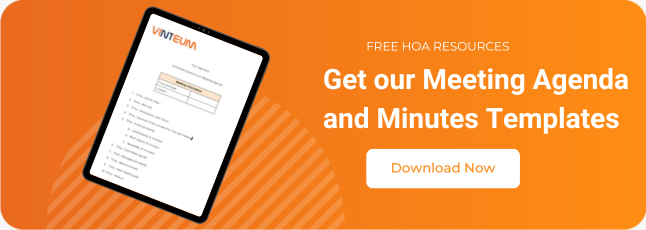As part of the HOA board, your main responsibilities include improving the community and creating a space where all residents can be comfortable. To implement effective projects within your HOA, it’s important to have meetings with your members.
An HOA meeting is essential and required in every community. It deals with various important matters such as amenities, events, emergencies, elections, and any conflicts that may arise.
Because they are crucial to ensuring a safe, comfortable, and happy community, we have gathered the 6 most important tips to run an HOA meeting.
Have a Well organized agenda
Before starting a meeting, it’s important to plan and organize everything needed to be discussed first. You should create a meeting agenda to establish what will be covered and talked about.
Firstly consider the purpose and the results expected to achieve at the end of the meeting. This will ensure that there is a direction in the discussion and that matters are treated effectively.
Secondly, plan the time needed to discuss the topics within the meeting, whether it is a quick checkup or a long discussion.
Finally, determine the topics needed to be covered, how they will be achieved, who will make the decisions, and any additional information needed.

Give notice
You should notify homeowners when and where the meeting is going to take place, as well as the agenda. Each state has a specific requirement for how many days in advance notices should be sent, but they are normally 7 or 30 days prior to the meeting.
Notifications are crucial as they ensure that the meeting has sufficient quorum – the amount of people needed for a vote to be considered.

Be Concise
HOA meetings take around 1 hour, being able to range from 30 to 90 minutes; therefore, topics of discussions need to be prioritized in order to prevent the meeting from losing focus and effectiveness.
Discussions can sometimes go in circles and never reach a solution, so it is your job to guide the meeting towards a more productive and effective conversation without being disrespectful and rude.
Have clear ground rules
There needs to be guidelines whenever a meeting is being held so that you can save time and solve problems more efficiently.
Here are some of the rules you should consider when creating your guidelines:
-
- Establishing who can be part of the meeting – will homeowners, vendors, possible homebuyers, and other interested members be able to participate? – this can be reviewed in your HOA’s by-laws
-
- Being patient and open-minded to others present
-
- Following the meeting agenda
-
- Being on time

Take minutes
Taking notes of what was discussed in the meetings is important in case there are any questions or concerns down the road. Official minutes will need to be drawn up afterwards. Minutes also ensure that there is transparency within meetings as it holds members accountable for what they said.
Minutes should be concise, clear, cover the main points discussed, the decisions reached, and the actions taken by the board that will positively serve the community.
Closing the meeting
You should wrap up the meeting in a clear and concise way so that everyone can be on the same page. Review everyone’s responsibilities and open up for any questions the members might have.
Depending on the issue being dealt with, you will have a different type of meeting.
5 Types of HOA Meetings + How to Run Each One
Board meetings
This meeting is open to all members and should be a chance for homeowners to interact with their board and discuss how the community is being managed. The topics that are typically discussed within these meetings are disputes between members, progress of projects, and resolutions. These meetings normally occur monthly or quarterly and are typically notified to residents with one week of anticipation.
How to run an HOA board meeting:
-
- Be prepared to make decisions at the board meeting. You should know what will be talked about in and prepare any possible questions
-
- Stay united. If you and another member disagree on a topic and can’t reach a compromise or an agreement, it may be best to table it, and discuss it at a later meeting, or take a vote.
-
- Be transparent. If there is any topic that might impact or be of concern to residents, they should be communicated.

Annual meetings
Annual meetings are also open to everyone and take care of more big picture topics. Annual budget is presented, board members are introduced, and any new projects are notified to residents.
How to run an HOA annual meeting:
-
- Start preparing the agenda 6-8 months in advance so that there is enough time to finalize it and get the word out to increase attendance rate
-
- You should discuss reports, projects, board nominees, have a time to vote, and a Q&A
-
- Know your quorum
-
- People often have many opinions and it isn’t always possible to address them in one go. This is why it can be beneficial to have a suggestion box.
Executive session
As more confidential information is discussed in the executive meetings, only the board of directors can attend. Litigation, attorney, problems with staff, or any other sensitive information are typically discussed. These meetings don’t occur frequently but they are normally held after a normal HOA board meeting.
How to run an HOA annual meeting:
-
- Provide notice and an agenda – their requirements will depend on your state’s laws.
-
- Minutes should still be taken during the meeting but not detail any sensitive or private information
-
- Review the governing documents to know what is allowed or not

Committee meeting
Committees like the landscaping committee and the security committee might need to have their own meetings – which are not necessarily run by the HOA board – in order to discuss their projects. They are open to the community and are usually required to have meetings to present their work.
How to run an HOA committee meeting:
-
- Lead committee member should take notes
-
- Review your HOA guidelines to determine how many meetings you need to conduct over the year
-
- Determine whether it will be a closed or open meeting
Special/emergency meeting
All of the meetings listed above need to be notified days in advance; however, special/emergency meetings are called in short notice because they need to discuss something urgent that requires immediate attention.
How to run a special/emergency meeting:
-
- The meeting can be either called by the president or any other two members of the board
-
- You can hold them in person, a video conference, or through email
-
- Minutes must be taken and should be available to all members
Wrapping Up: How to run an HOA Meeting
HOA meetings are necessary for any community to ensure that they are creating a positive and healthy environment for everyone present. By properly planning, organizing meeting agendas, being concise, establishing ground rules, taking minutes, you ensure a smooth, effective and productive meeting.




